Impact of altimeter-buoy data-pairing methods on the validation of Sentinel-3A coastal significant wave heights
IF 11.1
1区 地球科学
Q1 ENVIRONMENTAL SCIENCES
引用次数: 0
Abstract
Sea state information is critical for a broad range of human activities (e.g. shipping, marine energy, marine engineering) most of them being concentrated along the coastal zone. Satellite altimeter records of significant wave heights (SWH) represent the largest source of sea state observations available to date. However, the quality of altimeter observations is reduced in the coastal zone due to surface heterogeneity within the radar signal footprint. Major difficulties to assess the performance of coastal altimetry in the coastal zone are the reduced number of valid altimeter records and the increased sea state variability, which have recently fostered the development of new methods to pair and compare nearby altimeter and buoy data. In this study, we use a high-resolution numerical wave model implemented over the European coastal waters in order to characterize the spatial variability of sea states in the proximity of coastal in situ buoys, we explore different model-based data-pairing methods to account for coastal sea state variability and we assess their impact on the validation of Sentinel-3A 20Hz SWH measurements. Three Sentinel-3A processing modes are considered: the pseudo low rate mode processing, the SAR processing and the Low Resolution with Range Migration Correction (LR-RMC) processing. Our results indicate major impacts of data-pairing methods on the Sentinel-3A coastal validation and reveals the contribution of more frequent low SWH conditions, poorly resolved by radar altimeters, in the coastal zone as an additional source of errors in coastal altimetry.
高度计-浮标数据配对方法对验证哨兵-3A 海岸显著波高的影响
海况信息对广泛的人类活动(如航运、海洋能源、海洋工程)至关重要,其中大部 分活动都集中在沿岸地区。卫星测高仪记录的显著波高(SWH)是目前最大的海况观测资料来源。然而,由于雷达信号覆盖范围内的地表异质性,沿岸带的测高仪观测质量有所下降。要评估沿岸测高在沿岸带的性能,主要的困难是有效测高记录的数量减少和海况变 异性的增加,这促使人们开发新的方法来配对和比较附近的测高数据和浮标数据。在这项研究中,我们利用在欧洲沿岸水域实施的高分辨率数值波浪模式来描述沿岸原位浮 标附近海况的空间变异性,探索了不同的基于模式的数据配对方法来考虑沿岸海况的变异 性,并评估了这些方法对哨兵-3A 20Hz SWH 测量结果验证的影响。我们考虑了三种哨兵-3A 处理模式:伪低速率模式处理、合成孔径雷达处理和低分 辨率与距离迁移校正(LR-RMC)处理。我们的结果表明,数据配对方法对哨兵-3A 海岸验证有重大影响,并揭示了雷达测高计不能很好分辨的海岸带更频繁的低 SWH 条件是海岸测高误差的另一个来源。
本文章由计算机程序翻译,如有差异,请以英文原文为准。
求助全文
约1分钟内获得全文
求助全文
来源期刊

Remote Sensing of Environment
环境科学-成像科学与照相技术
CiteScore
25.10
自引率
8.90%
发文量
455
审稿时长
53 days
期刊介绍:
Remote Sensing of Environment (RSE) serves the Earth observation community by disseminating results on the theory, science, applications, and technology that contribute to advancing the field of remote sensing. With a thoroughly interdisciplinary approach, RSE encompasses terrestrial, oceanic, and atmospheric sensing.
The journal emphasizes biophysical and quantitative approaches to remote sensing at local to global scales, covering a diverse range of applications and techniques.
RSE serves as a vital platform for the exchange of knowledge and advancements in the dynamic field of remote sensing.
 求助内容:
求助内容: 应助结果提醒方式:
应助结果提醒方式:


